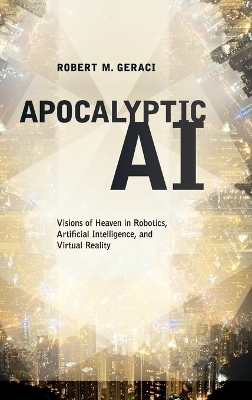
Apocalyptic AI
Visions of Heaven in Robotics, Artificial Intelligence, and Virtual Reality
Seiten
2010
Oxford University Press Inc (Verlag)
978-0-19-539302-6 (ISBN)
Oxford University Press Inc (Verlag)
978-0-19-539302-6 (ISBN)
Apocalyptic AI, the hope that we might one day upload our minds into machines and live forever in cyberspace, has become commonplace. This view now affects robotics and AI funding, play in online games, and philosophical and theological conversations about morality and human dignity.
Apocalyptic AI, the hope that we might one day upload our minds into machines and live forever in cyberspace, is a surprisingly wide-spread and influential idea, affecting everything from the world view of online gamers to government research funding and philosophical thought. In Apocalyptic AI, Robert Geraci offers the first serious account of this ¨cyber-theology¨ and the people who promote it, drawing on interviews with roboticists and AI researchers and even devotees of the online game Second Life. He points out that the rhetoric of Apocalyptic AI is strikingly similar to that of the apocalyptic traditions of Judaism and Christianity--in both systems the believer is trapped in a dualistic universe and expects a resolution in which he or she will be translated to a transcendent new world and live forever in a glorified new body. Geraci also shows how this worldview exerts significant influence by promoting certain types of research in robotics and artificial intelligence, and has also had an impact on philosophers of mind, theologians, and even legal scholars.
Apocalyptic AI, the hope that we might one day upload our minds into machines and live forever in cyberspace, is a surprisingly wide-spread and influential idea, affecting everything from the world view of online gamers to government research funding and philosophical thought. In Apocalyptic AI, Robert Geraci offers the first serious account of this ¨cyber-theology¨ and the people who promote it, drawing on interviews with roboticists and AI researchers and even devotees of the online game Second Life. He points out that the rhetoric of Apocalyptic AI is strikingly similar to that of the apocalyptic traditions of Judaism and Christianity--in both systems the believer is trapped in a dualistic universe and expects a resolution in which he or she will be translated to a transcendent new world and live forever in a glorified new body. Geraci also shows how this worldview exerts significant influence by promoting certain types of research in robotics and artificial intelligence, and has also had an impact on philosophers of mind, theologians, and even legal scholars.
Robert M. Geraci is Assistant Professor of Religious Studies at Manhattan College.
ACKNOWLEDGEMENTS; INTRODUCTION; APOCALYPTIC AI; APPENDIX 1: RISE OF THE ROBOTS; APPENDIX 2: IN THE DEFENSE OF ROBOTICS; BIBLIOGRAPHY
| Erscheint lt. Verlag | 18.3.2010 |
|---|---|
| Zusatzinfo | 3 halftones |
| Verlagsort | New York |
| Sprache | englisch |
| Maße | 236 x 163 mm |
| Gewicht | 488 g |
| Themenwelt | Geisteswissenschaften ► Philosophie ► Ethik |
| Geisteswissenschaften ► Psychologie ► Verhaltenstherapie | |
| Geisteswissenschaften ► Religion / Theologie | |
| Informatik ► Theorie / Studium ► Künstliche Intelligenz / Robotik | |
| ISBN-10 | 0-19-539302-3 / 0195393023 |
| ISBN-13 | 978-0-19-539302-6 / 9780195393026 |
| Zustand | Neuware |
| Informationen gemäß Produktsicherheitsverordnung (GPSR) | |
| Haben Sie eine Frage zum Produkt? |
Mehr entdecken
aus dem Bereich
aus dem Bereich
Buch | Softcover (2024)
REDLINE (Verlag)
20,00 €
was sie kann & was uns erwartet
Buch | Softcover (2023)
C.H.Beck (Verlag)
18,00 €


